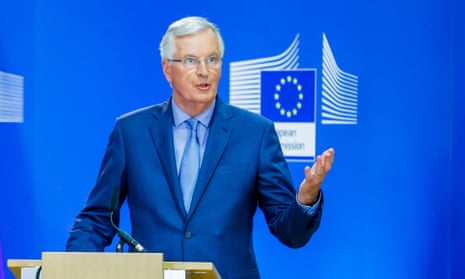Michel Barnier has launched his own appeal for hearts and minds in Europe by warning that Theresa May’s Brexit proposals, put forward in the UK government’s recent white paper, pose a threat to the future of the European single market.
In an article published in 20 newspapers across Europe, the EU’s chief negotiator writes: “The UK knows well the benefits of the single market. It has contributed to shaping our rules over the last 45 years. And yet, some UK proposals would undermine our single market, which is one of the EU’s biggest achievements.
“The UK wants to keep free movement of goods between us, but not of people and services. And it proposes to apply EU customs rules without being part of the EU’s legal order. Thus, the UK wants to take back sovereignty and control of its own laws, which we respect, but it cannot ask the EU to lose control of its borders and laws.”
The article will be seen as a direct rebuff to attempts by the British cabinet to persuade individual EU leaders and Europea business leaders to back the UK vision.
He writes of being hopeful of a deal being struck but suggests that the basic free trade agreement lifting tariffs on goods, alongside a security deal, is the best offer he can make.
Barnier’s line is a familiar one in Whitehall, but the publication of his article is incendiary given the push in recent days by May and her cabinet to try and forge a new approach to the negotiations with the EU27 states.
The British foreign secretary, Jeremy Hunt, met his counterparts in France and Austria to warn that the UK was on course for an “accidental no deal” if the EU did not rethink its rejection of the white paper, thrashed out at great political cost at Chequers. The Brexit secretary, Dominic Raab, was in Paris on Thursday to see Nathalie Loiseau, the French minister for European affairs.
Raab tweeted: “I had a warm and constructive first meeting with French Europe Minister @NathalieLoiseau. We discussed the progress of negotiations with Michel Barnier, the proposals in our White Paper and our shared commitment to work closely together”.
Loiseau tweeted in response: “Support #MichelBarnier, need to AGREE without delay an orderly withdrawal that respects the commitments made, wishes for a close and future balanced relationship between the EU and the United Kingdom: many topics of discussion.”
On Friday, May is cutting short the first leg of her holiday to meet France’s president, Emmanuel Macron, at Fort de Brégançon, his state residence on the Côte d’Azur.
A spokesman for Macron said Friday’s talks between the two leaders would not constitute a negotiation nor substitute for talks led by Barnier. The spokesman added that Macron had full trust in Barnier’s position on the UK white paper.
Barnier insisted in his article that he is not going beyond his mandate in ruling out the UK’s proposal for free trade in goods, based on a common rulebook on standards, but is reflecting the position of the 27 capitals for whom he works.
Barnier writes: “Let’s be frank: as the UK has decided to leave the single market, it can no longer be as close economically to the rest of the EU.
“The UK wants to leave our common regulatory area, where people, goods, services and capital move freely across national borders. These are the economic foundations on which the EU was built. And the European council – the 27 heads of state or government – as well as the European parliament have often recalled that these economic foundations cannot be weakened.”
Barnier’s article does reaffirm a willingness to be flexible on the Northern Ireland border issue.
The EU’s suggested solution to the problem – a common regulatory area for goods and customs with the rest of the EU – has so far been rejected by the UK as an attempt to constitutionally and economically dislocate Northern Ireland from the UK.
Describing the problem of avoiding a hard border on the island of Ireland as “the biggest risk” to a deal, Barnier reaffirmed he was “ready to improve” the EU’s proposal.
He also signalled that a backstop solution for the Irish border issue was vital as the political declaration that the EU will make on the future trading relationship will offer no guarantee of a successful negotiation on the details when the haggling starts in the transition period. Earlier this week, The Guardian revealed that the declaration is likely to be short and relatively vague, reflecting a belief that a detailed paper would only be shot down in parliament.
Barnier writes: “Since we will not know what the future relationship will bring by autumn 2018, we need to have a backstop solution in the withdrawal agreement.
“The UK agrees with this, and both the EU and the UK have said that a better solution in the future relationship could replace the backstop.
“What the EU has proposed is that Northern Ireland remains in a common regulatory area for goods and customs with the rest of the EU. We are ready to improve the text of our proposal with the UK.”
